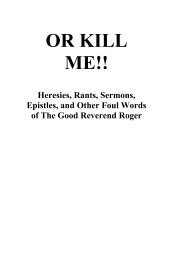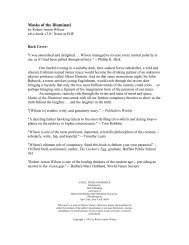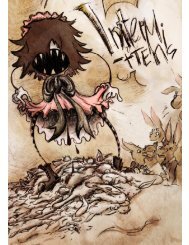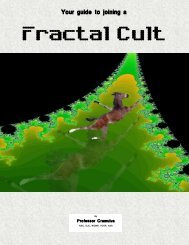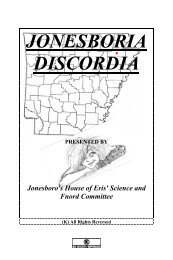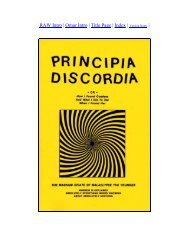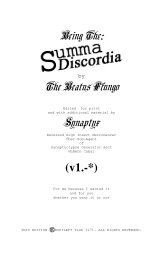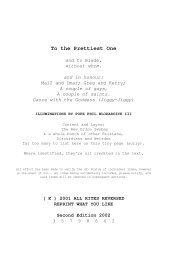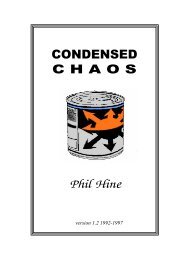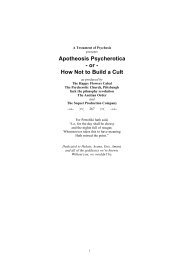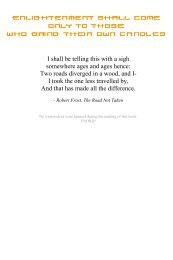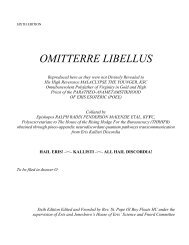Coincidance - Principia Discordia
Coincidance - Principia Discordia
Coincidance - Principia Discordia
Create successful ePaper yourself
Turn your PDF publications into a flip-book with our unique Google optimized e-Paper software.
88 COINCIDANCE<br />
Joyce's first use of death and absence as positives, in Dubliners, is the<br />
marvelous short story, "Ivy Day in the Committee Room." A group of<br />
minor political hacks are sitting around drinking Guiness's stout and<br />
carefully avoiding talking about anything serious. Gradually we discover<br />
that it is Ivy Day—October 6th, the anniversary of the death of Charles<br />
Stewart Parnell—and that all of them had, in one way or another, betrayed<br />
him. It is Parnell, still called "the Chief," who is physically dead and absent<br />
but very much alive and present in the haunted consciences of every man in<br />
the Committee Room.<br />
(Parnell organized the rent strikes of the 1880s, which for a time made it<br />
impossible for English landlords to collect Irish rents. He did not invent but<br />
popularized the boycott, which cut deeply into English profits in Irish markets.<br />
He became the leader of the "Home Rule" party and the most popular man<br />
in Ireland, called "Erin's uncrowned king," but fell from power after being<br />
denounced by the Roman Catholic clergy as an adulterer. After his political<br />
downfall he died quickly of pneumonia and, with what now seems prevision<br />
of 20th Century psychosomatic medicine, his few loyal followers insisted<br />
bitterly that "the Chief" had died of a broken heart.)<br />
"Ivy Day" ends, with superb Joycean irony, when a loyal Parnellite named<br />
Joe Hynes arrives and reads a poem in praise of the dead Chief. The poem is<br />
wretched, mawkish, awful, shot through with every dreadful cliche of<br />
popular Victorian verse; and, precisely because it is not great literature but<br />
the simple expression of genuine emotion by a simple man, it is strangely<br />
moving. The closing line of the story gives the reaction of Crofton, the most<br />
vehement anti-Parnellite in the Committee Room:<br />
Mr. Crofton said that it was a very fine piece of writing.<br />
The evasion of the meaning of the poem is obvious; whether Crofton is<br />
also hypocritical in praising the non-existent literary merits of the piece is<br />
unclear; maybe, like the author, Joe Hynes, Crofton is ignorant enough to<br />
think the verse is well written. Joyce, who believed ambiguity is the prime<br />
feature of human existence, loved to leave his readers with little mysteries<br />
like that. What is important is that the lyric, trite and dreadful as it is, makes<br />
Parnell the hero of the story:<br />
He is dead. Our Uncrowned King is dead.<br />
O, Erin, mourn with grief and woe<br />
For he is dead whom the fell gang<br />
Of modern hypocrites laid low<br />
In palace, cabin or in cot<br />
The Irish heart where'er it be



